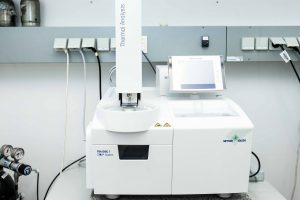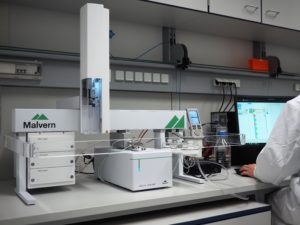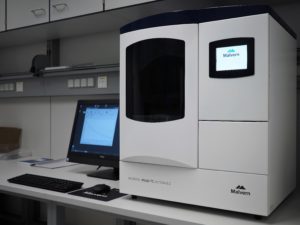Calorimetry / Gravimetry
Thermogravimetric Analysis / Differential Scanning Calorimetry
 One instrument. Many parameters.
One instrument. Many parameters.
Thermogravimetric analysis (TGA) is a method whereby changes in mass in a system as a function of temperature in a controlled atmosphere are measured to determine the physical composition of a small amount of material. It is often coupled with a second method of physical properties, such as, in our system, differential scanning calorimetry (DSC), which can measure the heat flow in and out of material as a function of temperature.
TECHNICAL INFORMATION
TGA/DSC Mettler-Toledo GmbH. Obtained 2013.
The instrument use state-of-the-art micro and ultramicro balances. The internal calibration ring weights ensure unsurpassed accuracy. The system measures up to 50 million resolution points continuously – weight changes of a 5-gram sample are determined with an accuracy as high as 0.1 μg. Samples can be heated with precise temperature ramps in an exactly controlled atmosphere (pure nitrogen, synthetic air, reactive gases).
 Differential Scanning Calorimetry
Differential Scanning Calorimetry
Gold standard for protein stability analysis.
Differential Scanning Calorimetry (DSC) is a powerful analytical technique which characterizes the thermal stability of proteins and other biomolecules. Different types of structural rearrangement are detectable by DSC as they require the absorption of energy in the form of heat. Even in dilute solutions of protein, the new MicroCal PEAQ-DSC systems detect such heat changes and use them to accurately characterize the thermal stability of the molecule under analysis.
TECHNICAL INFORMATION
MicroCal PEAQ-DSC Automated. Malvern. Obtained 2017.
The system delivers high throughput and sensitivity, with low sample consumption, in an integrated platform for increased productivity. Measurements of very thigh binding constants up to 1020 M-1 are possible. All cell filling and cleaning functions are fully automated, for walkaway operation. Automated data analysis supports the generation of high integrity thermal stability data and delivers compliance with regulatory requirements, whilst allowing easy integration into existing data handling and transfer systems.
More information and details about booking and terms of usage.
 Isothermal Titration Calorimetry
Isothermal Titration Calorimetry
Understanding biomolecular interactions.
Allows label-free in solution measurement of binding affinity and thermodynamics and determination of binding constants (KD), reaction stoichiometry (∆n), enthalpy (∆H) and entropy (∆S) in single experiment. The technique is based on the measurement of heat change when two molecules interact. This is done by the measurement of the differential power, that is applied to the cell heaters to maintain zero temperature difference between reference and sample cell, over time. Key benefits are exceptional sensitivity covering a broad dynamic range with a low sample consumption resulting in high quality data that is rich in information.
TECHNICAL INFORMATION
MicroCal PEAQ-ITC Automated. Malvern. Obtained 2017.
The system allows to run four 96-well plates fully automated, with a total capacity of 384 samples. It is equipped with three heaters, a reference calibration heater, a sample calibration heater and a cell main heater which operate at a temperature range between 2°C to 80°C. High sensitivity allows measuring sub-millimolar to picomolar dissociation constants (10-2 to 10-12 M) with as low as 10µg of protein.
More information and details about booking and terms of usage.